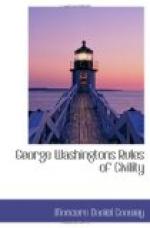Indeed, although Washington was precocious,—a surveyor at seventeen,—it would argue qualities not hitherto ascribed to him were we to suppose that, along with his faulty grammar and spelling, he was competent at fourteen for such artistic selection and prudent omission as are shown by a comparison of his 110 Rules with the 170 much longer ones of the English version. The omission of religious passages, save the very general ones with which the Rules close, and of all scriptural ones, is equally curious whether we refer the Rules to young Washington or to the Rector who taught him. But it would be of some significance if we suppose the boy to have omitted the precept to live “peeceably in that vocation unto which providence hath called thee;” and still more that he should have derived nothing from the following: “Do not think thou canst be a friend to the King whilst thou art an enemy to God: if thy crying iniquity should invite God’s judgments to the Court, it would cost thy Soveraigne dear, to give them entertainment.” If Washington was acquainted with Part ii. of “Youth’s Behaviour,” relating to women and dedicated to ladies of the Washington race, it is remarkable that no word relating to that sex is found among his Rules.[1]
[Footnote 1: In the edition of Hawkins (1663) bound up with Part ii. in the British Museum (bearing on the cover the name and arms of the “Hon’ble Thos. Greville”) there is just one precept concerning women: “If thou art yet unmarried, but intendest to get thee a wife modest, rather than beautiful, meddle not with those Ladies of the Game, who make pageants of their Cheeks, and Shops of their Shoulders, and (contrary to all other Trades) keep open their Windows on the Sabbath-day, impudently exposing their nakedness to the view of a whole Congregation,” &c. There are, in an appendix, pictures of a puritanically shrouded “Virtue,” and a “Vice” who, apart from the patches on her face, singularly resembles a portrait of pretty Lady Ferrars in Codrington’s book (ante, p. 21) ed. 1672.]
On the whole, though it is very uncertain, the balance of probabilities seems to favour the theory that the Rules of Civility, found in a copy-book among school exercises, exceedingly abbreviated, and marked by clerical errors unusual with Washington, were derived from the oral teachings of his preceptor; that this Frenchman utilised (and was once or twice misled by) the English version along with the original, which had been used as a manual in his Rouen College.
The Marie family of Rouen,—from which came the Maryes of Virginia,—is distinguished both in Catholic and Huguenot annals. Among the eminent Jesuit authors was Pierre Marie, who was born at Rouen, 1589, and died at Bourges, 1645. He was author of “La Sainte Solitude; ou les Entretiens solitaires de l’ame,” and of “La Science du Crucifix: en forme de meditations.” The family was divided by the Huguenot movement, and a Protestant branch took root in England. Concerning the latter, Agnew (French Protestant Exiles, i. p. 100) gives the following information:—




